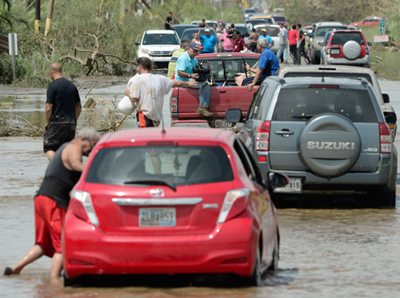
Vol. 81/No. 37 October 9, 2017
(front page, Socialist Workers Party statement)
Puerto Rico crisis product of capitalism, colonial rule
Massive aid to Puerto Rico! End US colonial rule!

The following statement was released Sept. 26 by Osborne Hart, Socialist Workers Party candidate for mayor of New York. Hart was in Puerto Rico in May participating in celebrations there when longtime political prisoner Oscar López won his freedom and discussing the common interests of Puerto Ricans and workers in the United States in fighting U.S. colonial rule over the island. In June he spoke for the party at U.N. hearings on decolonization, backing the call for independence for Puerto Rico.
It’s U.S. imperialism’s colonial exploitation of Puerto Rico that turned hurricanes Irma and Maria into a deep social crisis. The decrepit electrical grid and the deteriorating health care systems that collapsed under the weight of the storms are no accident. They are a result of the conscious decisions of the colonial regime and the U.S. ruling families to force the working class and farmers of Puerto Rico to pay the $74 billion debt.
The Socialist Workers Party says cancel the debt! All of it! Provide all the aid Puerto Rico needs with no strings attached! And abolish the U.S.-imposed financial board!
U.S. corporations suck out billions of dollars in profits from its colony Puerto Rico every year, exploiting the island’s cheap labor and abundant natural resources. The U.S. rulers have been using the Barack Obama-appointed Financial Oversight and Management Board — which has dictatorial control over the island’s finances — to bleed Puerto Rico dry to maximize payments to bondholders.
The colonial regime’s criminal lack of preparations and the callous actions after the storms continue the “save-yourself-if-you-can” attitude that marked the response from Washington to the local governments in Florida and Texas to the hurricanes there.
Cuba shows what a difference a revolution makes. It was hard hit by Hurricane Irma. But unlike the colonial regime in Puerto Rico, in Cuba the revolutionary government organized working people in advance to take the necessary precautions and make sure that shelters were fully stocked with food, water, medicine and medical personnel. It put thousands of linemen and construction workers in place so that as soon as the storm passed, reconstruction and electrical repairs could begin immediately.
The revolutionary government mobilized the entire people and is providing the materials and tools to do whatever is needed.
The Cuban response was organized under the principle that no one would be left on their own. And in the midst of the challenges they face, the Cuban people stepped up their internationalist missions to provide aid to fellow Caribbean nations ravaged by the storms.
The Cuban government’s offer to send four brigades of electrical workers and a mobile hospital with 39 doctors to Puerto Rico — an offer Washington hasn’t even acknowledged — shows that when Cuban revolutionaries say they “share what they have, not what’s left over,” they mean it.
The social crisis unfolding in Puerto Rico highlights why working people on the island need to emulate the Cuban Revolution and fight to replace the capitalist colonial regime with a government of workers and farmers, a fight that is intertwined with the fight for independence from Washington’s colonial rule.
Workers in the United States should stand in solidarity with our brothers and sisters in Puerto Rico because our interests are the same. Cancel the debt! Massive aid now! End U.S. colonial rule!
Related articles:
Social disaster leaves people without electricity, water
How revolutionary Cuba responds to hurricanes
Cuban gov’t offers electrical workers to Puerto Rico
Miami: SWP campaigns amid hurricane’s carnage
Front page (for this issue) | Home | Text-version home